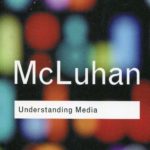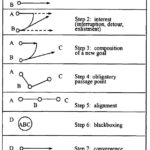
Moralidade e tecnologia (Latour 2002)
LATOUR, Bruno. 2002. Morality and technology: the end of the means. Theory, Culture & Society 19(5/6):247-60.
TECHNOLOGY as FOLD:
Technology is everywhere, since the term applies to a regime of enunciation, or, to put it another way, to a mode of existence, a particular form of exploring existence, a particular form of the exploration of being – in the midst of many others. […] The regime of technology, if you wish, is different from another standpoint (scientific, artistic or moral) not in the way that a region of reality would differ from another, but in the way prepositions differ amongst themselves, in much the same way as ‘in’ is clearly distinguishable from ‘by’, although there is no particular domain of ‘in’ that we can separate from the territory ‘by’. I would like to define the regime proper to technology by the notion of fold […]. […] What is folded in technical action? Time, space and the type of actants. (p.248-9)
UNFOLDING & FOLDING THE HAMMER:
There is nothing less local, less contemporary, less brutal than a hammer, as soon as one begins to unfold what it sets in motion; there is nothing more local, more brutal and more durable than this same hammer as soon as one folds everything implicated in it. (p.249)
THE ORGAN CREATES THE FUNCTION (Gibson’s affordance), so THE TOOL IS NOT A SIMPLE EXTENSION OF THE ORGAN:
Those who believe that tools are simple utensils have never held a hammer in their hand, have never allowed themselves to recognize the flux of possibilities that they are suddenly able to envisage. […] [A]ll technologies incite around them that whirlwind of new worlds. Far from primarily fulfilling a purpose, they start by exploring heterogeneous universes that nothing, up to that point, could have foreseen and behind which trail new functions. (p.250)
MEDIATORS x INTERMEDIARIES:
If we are not careful, we would reduce technologies to the role of instruments that ‘merely’ give a more durable shape to schemes, forms, and relations which are already present in another form and in other materials. (p.250)
TECHNICAL MEDIATION = BEING-AS-ANOTHER: (p.250)
TECHNOLOGY=DETOUR=”the art of the curve”=TRANSLATION=INGENUITY=DAEDALUS=”the unexpected branching-out which at first distances us from the goal”: (p.251)
TECHNOLOGY BECOMES “MEANS” WHEN WE BYPASS (by habit and forgetting) ITS MEDIATIONS: (p.251-2)
PROCESSO DE HUMANIZAÇÃO (a dignidade ontológica da tecnologia):
In defining the hold of technology in terms of the notions of fold and detour, I think I have returned it to its ontological dignity. Without technologies, human beings would not be as they are, since they would be contemporaneous with their actions, limited solely to proximal interactions. Incapable of substituting anything whatsoever for absent entities that would stand in their place, they would remain without possible mediation, that is to say, without the ability to pass unexpectedly through the destiny of other completely heteroneneous beings, the possibilities of which are added to their own, thus inaugurating the progress of multiple histories, properly speaking. […] Without technological detours, the properly human cannot exist. […] Generalizing the notion of affordance, we could say that the quasi-subjects which we all are become such thanks to the quasi-objects which populate our universe with minor ghostly beings similar to us and whose programmes of action we may or may not adopt. (p.252-3)
MORAL LAW (super-ego & under-ego):
Of course, the moral law is in our hearts, but it is also in our apparatuses. To the super-ego of tradition we may well add the under-ego of technologies in order to account for the correctness, the trustworthiness, the continuity of our actions. (p.253-4)
MORALITY:
Morality too is a mode of existence, a standpoint on being-as-another, a predisposition, an original regime of mediation. (p.254)
Morality […] appears thus a concern which ceaselessly works upon being-as-another to prevent ends from becoming means, mediators from being transformed into simple intermediaries. (p.256)
[M]orality is from the beginning inscribed in the things which, thanks to it, oblige us to oblige them. (p.258)
CRISIS OF MODERN DOMINATION:
[T]here are no masters anymore (p.255)
ANTHROPOLOGY in SIMONDON e SOURIAU:
Morality and technology are ontological categories, as Gilbert Simondon following Etienne Souriau […] has so well expressed it, and the human comes out of these modes, it is not at their origin. (p.256)
BEING-AS-ANOTHER:
Nothing, not even the human, is for itself or by itself, but always by other things and for other things. This is the very meaning of the exploration of being-as-another, as aleration, alterity, alienation. (p.256)
MORALITY & TECHNOLOGY:
Morality comes to rework precisely the same materials as does technology, but by extracting from each of them another form of alterity because its primary concern is the impossibility of their fitting into the mould of intermediaries. (p.257)
THE WORK OF MEDIATION:
The work of mediation, in its moral organization, requires […] the ceaseless circuit of concern, the penetrating return of scruple, the anxious reopening of the tobs in which automatisms have been heaped, the redeployment of means into partial aims and aims into partial ends. (p.258)
PRECAUTIONARY PRINCIPLE (morality X technology):
[T]he principle of precaution resides in the permanent maintenance of the impossibility of folding – which is precisely what technology aspires to: whence the permanent conflict of ways of being. To maintain the reversibility of foldings: that is the current form that moral co9ncern takes in its encounter with technology. […] It is in this new sense that morality finds itself in permanent and continuous conflict with the openness to history that technology constantly suggests (p.258)
THE END OF THE MEANS
As one can see, the relation of technology to morality is somewhat modified as soon as we renounce the idea of putting the first on the side of means and the second on the side of ends. […] If one adds morality to technology, one is bound to notice, to make a pun, the end of the means. (p.258)





 LaSPA is located at the Institute of Philosophy and Human Sciences (
LaSPA is located at the Institute of Philosophy and Human Sciences (